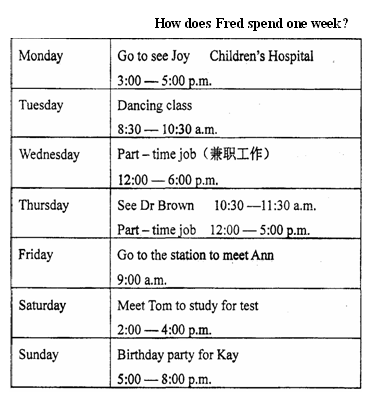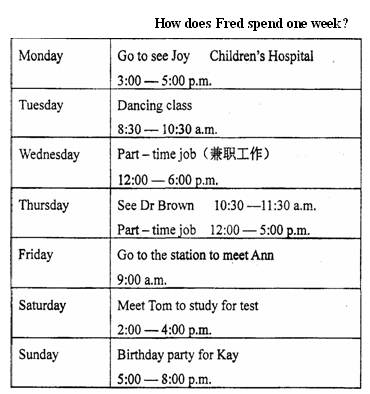
題目列表(包括答案和解析)
1
In the depths of my memory, many things I did with my father still live. I call these things 1 and love.
I don’t remember my father ever getting into a swimming pool. But he did 2 the water. Any kind of 3 ride seemed to give him pleasure. 4 he loved to fish; sometimes he took me along.
But I never really liked being on the water, the way my father did. I liked being 5 the water, moving through it, having it all around me. I was not a strong 6 , or one who learned to swim early, for I had my 7 . But I loved being in the swimming pool close to my father’s office and 8 those summer days with my father, who 9 come by on a break. I needed him to see what I could do. My father would stand there in his suit, the 10 person not in swimsuit.
After swimming, I would go 11 his office and sit on the wooden chair in front of his big desk, where he let me 12 anything I found in his top desk drawer. Sometimes, if I was left alone at his desk while he worked in the lab, an assistant or a student might come in and tell me perhaps I shouldn’t be playing with his 13 . But my father always showed up and said easily, “Oh, no, it’s fine.” Sometimes he handed me coins and told me to get 14 an ice cream…
A poet once said, “We look at life once, in childhood; the rest is memory.” And I think it is not only what we “l(fā)ook at once, in childhood” that determines our memories, but 15 , in that childhood, look at us.
1.A. hope B. joy C. anger D. worry
2.A. hate B. refuse C. praise D. love
3.A. boat B. bus C. train D. bike
4.A. But B. Then C. And D. Still
5.A. on B. off C. by D. in
6.A. swimmer B. rider C. walker D. runner
7.A. hopes B. likes C. rights D. fears
8.A. spending B. saving
C. wasting D. destroying
9.A. should B. would C. had to D. could
10.A. next B. only C. other D. last
11.A. away from B. out of C. by D. inside
12.A. put up B. break down C. play with D. work out
13.A. fishing net B. office things
C. wooden chair D.lab equipment
14.A. the student B. the assistant C. myself D. himself
15.A. which B. who C. what D. whose

7. Where does Fred meet Ann?
A. At Brown’s house. B. In the hospital.
C. At the station. D. At Kay’s house.
8. How many hours a week does Fred do his part—time job?
A. Five hours. B. Six hours. C. Ten hours. D. Eleven hours.
9. is ill in hospital(醫(yī)院).
A. Brown. B. Joy C. Tom. D. Kay.
10. Kay’s birthday is on .
A. Tuesday. B. Friday. C. Sunday. D. Thursday.
11. What does Fred do on Saturday afternoon?
A. Play football. B. Study with Tom.
C. Have a dancing class. D. Do part—time job.

7. Where does Fred meet Ann?
A. At Brown’s house. B. In the hospital.
C. At the station. D. At Kay’s house.
8. How many hours a week does Fred do his part—time job?
A. Five hours. B. Six hours. C. Ten hours. D. Eleven hours.
9. is ill in hospital(醫(yī)院).
A. Brown. B. Joy C. Tom. D. Kay.
10. Kay’s birthday is on .
A. Tuesday. B. Friday. C. Sunday. D. Thursday.
11. What does Fred do on Saturday afternoon?
A. Play football. B. Study with Tom.
C. Have a dancing class. D. Do part—time job.
“I’ve been writing a book, John. Do you think anyone would be interested in 1 it?” said the old lady.
John took over the papers from her shaking hand and seated her in chair. He remembered her rich 2 in the early days of the Old West. He looked through the papers. “It’s good, Grandma,” he said gently. Then realizing that she 3 hear him, he shouted into her ears, “I think it’s very good. I’ll 4 it to a publisher (出版商).”
Ten days later, he reported that the publisher had had time to read only a few 5 . But he was so impressed (給...留下深刻的好印象) that he had sent $ 100 for an option(版權(quán)). More money would be given as an advance (預(yù)付款). Every month John 6 $100 for her with a letter from the publisher telling about the progress of the book.
One morning, three months after her 100th birthday, Grandma didn’t get up. The doctor told her that she couldn’t 7 more than a few days. She was ready to go, but she first wanted her book to be in print. John promised that she could get it very soon.
Grandma held on until the day the book came into her hands with the title and her name on the cover. Though she couldn’t see it, she could touch it. She proudly traced(找到)her name with her fingers(手指), tears(眼淚) in her eyes. Two hours later, she died peacefully, 8 holding her book.
Her granddaughter took up the book and opened it. “Why, it’s just blank pages!” she cried in 9 . John’s face turned 10 . Then the girl understood. There never was a book. Grandma couldn’t hear the little bell when the typewriter came to the middle of the line. She would keep on working, not knowing the whole sentences and sometimes the paragraphs were missing. John did not tell her, for he couldn’t take away her only hope. It was John himself who had written the letters and sold his car to pay the advance.
( ) 1. A. buying B. publishing C. reading D. lending
( ) 2. A. sufferings B. experiences C. thoughts D. family
( ) 3. A. couldn’t B. needn’t C. mustn’t D. doesn’t
( ) 4. A. throw B. put C. send D. lift
( ) 5. A. words B. sentences C. pages D. books
( ) 6. A. brought B. took C. gave D. carried
( ) 7. A. die B. stay C. last D. sleep
( ) 8. A. still B. yet C. always D. then
( ) 9. A. anger B. joy C. surprise D. tears
( ) 10. A. white B. red C. gray D. pale

湖北省互聯(lián)網(wǎng)違法和不良信息舉報平臺 | 網(wǎng)上有害信息舉報專區(qū) | 電信詐騙舉報專區(qū) | 涉歷史虛無主義有害信息舉報專區(qū) | 涉企侵權(quán)舉報專區(qū)
違法和不良信息舉報電話:027-86699610 舉報郵箱:58377363@163.com